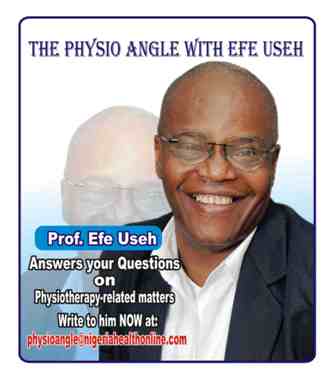Dear reader,
Welcome to my world
As we begin to age and become relatively less active, we experience different ailments that require different physiotherapy interventions. The joints of our knees, hips, back and necks begin to ache, with occasional stiffness, tingling sensation and numbness. We are easily fatigued following minor tasks. There are several other conditions too, not restricted to the elderly which require management with physiotherapy. Unfortunately, most of us simply resort to self help when such ailments occur and will not think of seeking necessary professional intervention until the situation seems to be getting out of hand. The goal of this column is therefore to enlighten readers on the numerous ways physiotherapy will provide necessary remedy to such conditions. This is in view of the fact that access to quality and evidence based physiotherapy is a challenge in this country, like elsewhere in the world, with our poor ratio of one physiotherapist to about 170,000 persons. No doubt, people requiring physiotherapy are increasing. So feel free to contact me here if you or your loved ones need help on any of these conditions.
Efe Useh
Now to your questions.
Can Physiotherapy help my dad? He suffered a stroke
My 76-year-old dad had a stroke three weeks ago and was discharged after two weeks. He is still struggling to make clear sentences and can still not walk. His left arm and leg are badly affected. We were told his condition will improve if he was taken for physiotherapy. We are all so traumatized in the family and really don’t know how to go about this.
Just how can we assist him? How can physiotherapy help? Is this not going to be another expensive venture?
Jude, Lagos
Dear Jude,
Let me start by indicating that every patient should be managed as a unique individual based on a comprehensive (medical, subjective, social history) examination. So many factors would be considered in managing your 76-year-old father who had a stroke three weeks ago. These factors, amongst others, include his past medical history and the fact that he is 76 years old and quite vulnerable to so many possible medical conditions such as diabetes mellitus and hypertension – which are common risk factors for stroke. We might also want to know if he is on any chronic medication. Has he defaulted? If yes? Why? These are questions that would determine if your family will benefit from some form of social support.
Stroke is a disease that affects the blood vessels leading to and within the brain. It is known to commonly cause death in some persons and it’s a leading cause of disability that requires physiotherapy and rehabilitation. Members of the rehabilitation team usually include the physiotherapist, Occupational therapist, Speech Therapist, Biomedical Engineers, Prosthetists, and Orthotists. Your father will require the services of a speech Therapist for his speech since he is not able to make clear sentences. There are however very few Speech Therapists in Nigeria but we will gladly link you with a few that are registered with the Medical Rehabilitation Therapists Board of Nigeria. You may contact the Editor for further details.
Your father will no doubt benefit from physiotherapy not only for his left arm and leg but for the whole body. The prognosis of recovery following stroke is dependent on early rehabilitation and the amount of damage that is done to the brain during stroke. Physiotherapy and Occupational Therapy would assist with the holistic functioning of your father in his return to his normal activities of daily living (such as sitting independently, having his bath, etc). The return of the function to the arms and leg following the initial period of flaccid (soft) paralysis might be followed by spasticity (hard) with minimal coordination. I will strongly recommend that your father starts physiotherapy immediately to assist with quick recovery. You can get these services from most government hospitals in Lagos State.
The physiotherapist will assist with appropriate positioning and functioning programme.
Let me give some details here. A stroke occurs when a blood vessel that carries oxygen and nutrients to the brain is either blocked by a clot or bursts (or ruptures).The paralysis of the left side of the body results from a right brain stroke which happens when the blood supply to the right side of the brain is stopped. The right side of the brain oversees the left side of the body. It also does some thought processing, helps us know body position, and judge space and distance. There are two main types of strokes: ischemic and hemorrhagic.
The effects of a right hemisphere stroke may include left-sided weakness or paralysis and sensory impairment. This might result in the denial of paralysis or impairment and reduced insight into the problems created by the stroke (this is called “left neglect”), visual problems – including an inability to see the left visual field of each eye – sudden dizziness, loss of balance, or coordination, loss of vision or changes to your vision in one or both eyes (usually happens suddenly), feeling confused or having trouble understanding things that are usually easy for you, numbness or weakness on one side of the body (or in one arm or leg).
The main cause of hemorrhagic stroke is high blood pressure, which can weaken the arteries in the brain and make them more likely to split or rupture. When an individual suffers from a stroke or any illness, it affects the entire family. There is usually a disruption of usual family interaction and an intense need for psycho-social support and interventions, because it is usually traumatic. The family will thus benefit from the services of a social worker and a clinical psychologist. The editor will assist with these contacts.
Best Wishes

